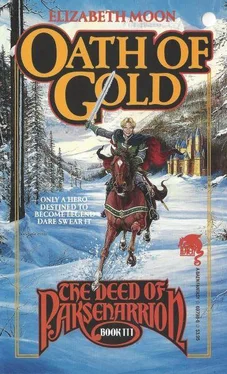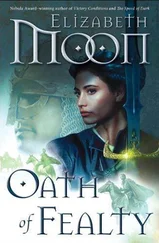Elizabeth Moon - Oath of Gold
Здесь есть возможность читать онлайн «Elizabeth Moon - Oath of Gold» весь текст электронной книги совершенно бесплатно (целиком полную версию без сокращений). В некоторых случаях можно слушать аудио, скачать через торрент в формате fb2 и присутствует краткое содержание. ISBN: , Жанр: Фэнтези, Боевая фантастика, на английском языке. Описание произведения, (предисловие) а так же отзывы посетителей доступны на портале библиотеки ЛибКат.
- Название:Oath of Gold
- Автор:
- Жанр:
- Год:неизвестен
- ISBN:0-671-69798-6
- Рейтинг книги:3 / 5. Голосов: 1
-
Избранное:Добавить в избранное
- Отзывы:
-
Ваша оценка:
- 60
- 1
- 2
- 3
- 4
- 5
Oath of Gold: краткое содержание, описание и аннотация
Предлагаем к чтению аннотацию, описание, краткое содержание или предисловие (зависит от того, что написал сам автор книги «Oath of Gold»). Если вы не нашли необходимую информацию о книге — напишите в комментариях, мы постараемся отыскать её.
Oath of Gold — читать онлайн бесплатно полную книгу (весь текст) целиком
Ниже представлен текст книги, разбитый по страницам. Система сохранения места последней прочитанной страницы, позволяет с удобством читать онлайн бесплатно книгу «Oath of Gold», без необходимости каждый раз заново искать на чём Вы остановились. Поставьте закладку, и сможете в любой момент перейти на страницу, на которой закончили чтение.
Интервал:
Закладка:
And here she was, bound helpless before enemies who enjoyed her pain, an example, as they said, of Liart’s power. An example to teach more fear, more hatred, proof that the dream of glory had been false: no power, no bright sword or prancing horse, no protection, even for herself.
But the image of her dream steadied, and did not fade. No one whole wanted to be hurt, wanted to be the victim of such cruelty as held her now. Her fears were as common as a taste for salt or honey, as healthy as the desire for comfort, for love. So much she had learned from the Kuakgan. Now, at last, she accepted her right to share those fears: she did not have to deny them, only master herself.
And this, she saw, her dream had done. She had built against that fear a vision of power not wholly selfish—power to protect not only herself, but others. And that vision—however partial it had been in those days—was worth following. For it led not away from the fear, as a dream of rule might do, but back into it. The pattern of her life—as she saw it then, clear and far away and painted in bright colors—the pattern of her life was like an intricate song, or the way the Kuakgan talked of the grove’s interlacing trees. There below were the dream’s roots, tangled in fear and despair, nourished in the death of friends, the bones of the strong, the blood of the living, and there high above were the dream’s images, bright in the sun like banners or the flowering trees of spring. And to be that banner, or that flowering branch, meant being nourished by the same fears: meant encompassing them, not rejecting them.
She did not know herself when these thoughts linked at last, forming the final pattern, bringing up into her mind the self she had become. It was then as if several selves were present, mysteriously separate and conjoined. Trapped inside her body was the same child she had been, feeling each new torment as a wave of intolerable pain, each ragged scream as a fresh humiliation. The seasoned soldier watched with pity as her body gave way to exhaustion and pain as any body would, feeling no shame at the sight or sound or smell of it, for this was something that could happen to anyone, and she had never inflicted it on others. And someone else, someone newer, refused the soldier’s tactics of defiance, anger, vengeance, and looked into her own fear to find the link to those around her, to find the way to reach those frightened tormentors, the ones not already lost to evil.
In the rare respites, when the priests stopped to harangue the crowd and revive her for more torture, she felt curiously untroubled. Not free of pain, nor free of fear, but free of the need to react to that fear in all the old ways. She had no anger left, no hatred, no desire for vengeance, nothing but pity for those who must find such vile amusements, who had no better hope, or no courage to withdraw. It would all happen to her—all the things she’d feared, every violation of body, everything she’d taken up the sword to prevent—and she consented. Not because it was right: it was never right. Not because she deserved it: no one deserved such violation. But because she could consent, being what she was, and by consenting destroy its power over her and others, proving in her own body that fear’s power came from fear, that greater power could from the same dark roots find another way to the light.
This quietness, this consent, formed a still pool in the center of that violent place. At first, only the priests noticed, and flung themselves into a frenzy of violence against it. But it was not brittle steel to break, or crystal to shatter, but a strength fluid and yet immovable, unmarred by the broken rhythm of her breath, or even by her screams. The quietness spread, from gray eyes that held no hatred for those who spat at her face or tasted her blood, from a voice that could scream in pain yet mouth no curses after, that spoke, between screams, in a steady confirmation of all good.
Those watching could not deny the wounds: they had seen them being dealt: they had helped deal them. They could not deny the sight of blood, the smell of it, the sticky feel of it, the salt taste on too many tongues. They could not deny the stink of burnt flesh, the sight of scabbed and crusted wounds, the dead servant girl, the boy’s back striped and bleeding. This was not the quietness of inviolable protection, for she suffered all that was done to her. They had seen a virgin raped, a soldier’s scars mocked and redrawn in fresh blood. They had heard a paladin scream, as the priests promised.
And yet she did not hate, and yet she did not fear, and yet she said, when she had breath to speak, that the High Lord’s justice would rule in the end. The priests shouted threats, promised more torments, blustered and postured: the silence spread, as a pool rises silently above a new-broken spring when the dry season ends.
One by one the crowd fell still, or joined the mockery with less eagerness. She was so small, after all, broken like that . . . they could think of sisters, cousins, friends they had known, who might be where she was, if she were not there. They had thought it would be satisfying to see a paladin, one of the proud and powerful, brought low. But they knew her story, from the year that cruel rumor spread the tale of her cowardice. She was only a peasant girl, born into poverty. What did it prove to shame a sheepfarmer’s daughter who had known shame already? Some among them had been soldiers, and recognized the scars of a common soldier who has seen hard service. They felt no braver for breaking a soldier’s scarred hands. And those who had first laughed to see a virgin raped—and even those who had joined in eagerly—now looked from the dead servant girl to the other, and found something pitiful in both, something shameful in themselves, that they could take pleasure in such pain. She was no threat to them—why had they ever thought she was a threat? Paladins never threatened the helpless. The threat was elsewhere, in those who wore Liart’s horned circle, who flourished the barbed whips and the heated chains.
By such small degrees the crowd’s mood changed, shifting back in sudden fear when the priests turned their weapons on individuals chosen not quite at random, but slowly, inexorably, turning away from the praise of cruelty to some vague sympathy with suffering. Glass by glass, as the torches burned down and were replaced again and again, as the day passed into night and another day, and another night and day, one and another of those watching came slowly and without intent to a new vision of the world.
Of all this, Paks was hardly aware. At best, she knew what she must do, and why, but those moments seemed few. Pain followed pain in sickening procession; at times even her new insight failed, leaving her adrift in self-disgust or despair. For the most part she concentrated on refusing anger and hatred, accepting the pain as a necessary part of something chosen long before. When they broke her hands, each bone a separate torment, she struggled against her old fear of crippling. She had clung to the hope that if she lived, she would still be whole, able to fight. But she knew better, knew from having lived through it that she was more than a hand to hold a sword. She could live, being Gird’s paladin, with no more than breath, or die whole, of old age, and be nothing at all. The difference lay in her, was her, was what she had become: no one but she could change it. The rapes, that she had feared before as both violation and torment wholly unknown, were then nothing but physical pain, no worse than others. She lost nothing, for she had had nothing, had never invested herself in that, or hoped for that kind of pleasure. It seemed to her that Alyanya came in a dream, and comforted her, but dream, vision, and reality were by then too nearly mixed for clear memory.
Читать дальшеИнтервал:
Закладка:
Похожие книги на «Oath of Gold»
Представляем Вашему вниманию похожие книги на «Oath of Gold» списком для выбора. Мы отобрали схожую по названию и смыслу литературу в надежде предоставить читателям больше вариантов отыскать новые, интересные, ещё непрочитанные произведения.
Обсуждение, отзывы о книге «Oath of Gold» и просто собственные мнения читателей. Оставьте ваши комментарии, напишите, что Вы думаете о произведении, его смысле или главных героях. Укажите что конкретно понравилось, а что нет, и почему Вы так считаете.












